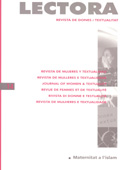Maghrebian mothers of french daughters. Motherhood, gender relationships and immigrant maghrebian women in France on Yamina Benguigui’s cinema
Keywords:
emigración-inmigración, Magreb, Islam, historia de las mujeres, género y cineAbstract
This text focuses on cultural representations and the practice of maternity on a migration-immigration situation; this situation which, even though it is as antique as History itself, is the center of one of the most passionate debates on politics, media and the academic world nowadays. Therefore, what these pages intend to propose is the apparently easy subject of how maternity in the migration-immigration situation is conceived and performed, partucularly in the heart of the Maghibrian comunity in France. In order to do this, we have chosen to study the oral testimonies in two documentary films made by the French director, Argelian by birth, Yamina Benguigui: Femmes d’Islam (1994) y Mémoires d’immigrés, l’héritage maghrébin (1997). We will also analize the production of her first fiction movie Inch’Allah Dimanche (2001); finally we will examine the intencionality of the filmmaker considering the triple perspective of the history of migrations, the history of women, and the relations between contemporary history and cinema.Downloads
Published
How to Cite
Issue
Section
License
The Author retains ownership of the copyright in this article and grants Lectora: revista de dones i textualitat the rights to print publication of the Article. The work will be available under a Creative Commons Attribution-Noncommercial-No Derivative Works license, by which the article must be credited to the Author and the Journal be credited as first place of publication.
The Author is free to enter in seperate, additional contractual agreements for the non-exclusive distribution of the work as published in this journal (such as institutional repositories or a book), as long as the original publication in Lectora is credited.
The Author is encouraged to post the work online (eg in institutional or thematic repositories, or in their website), as it can lead to productive exchanges as well as to a greater citation of the published work (see The Effect of Open Access).




